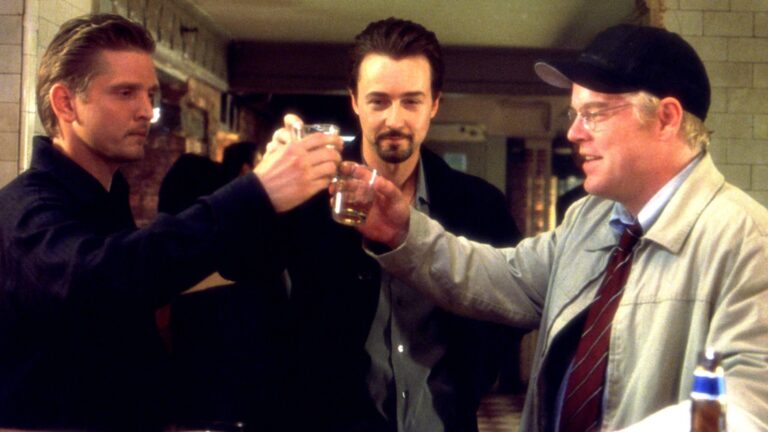Where to Watch:
8.6/10
FilmFascination Rating
25th Hour wasn’t a movie I expected I’d end up writing about. It had lingered in my watchlist for far too long—one of those titles you keep saying you’ll get to eventually. The plot intrigued me when I first read the synopsis: a New York drug dealer named Monty has just 24 hours before he goes to prison for seven years. But seven years isn’t just a number—it’s a lifetime. Everything changes. People move on. You come out someone else. That idea alone puts things into a sobering perspective.
What’s striking about 25th Hour is how it’s told—jumping between the past and the present, revealing pieces of Monty’s story in fragments that hit you just when the emotional weight gets too much to bear. It’s an effective storytelling technique that helps us navigate Monty’s world, without drowning in it all at once. It isn’t often that you find yourself sympathizing with a drug dealer. But Spike Lee doesn’t paint Monty as a caricature or a villain—he gives him a soul. And when you start to see the world through Monty’s eyes, judgment fades. You’re left with a man facing the consequences of his choices, a man who perhaps never truly belonged in the world he entered.
Sure Monty is a drug dealer but he isn’t Tony Montana. He’s a scholarship kid who fell into the drug trade for the money. He’s not violent or ruthless—he’s conflicted. The film opens with him rescuing a wounded dog left for dead, immediately telling us something about who he really is. That one act alone makes it hard to reconcile him with the Russian mob world he’s supposedly part of. At least, not on this day—the final day of his freedom.
The clock is ticking, and Monty has a few things to do: say goodbye to the people he loves, confront the ones he suspects betrayed him, and come to terms with what’s ahead. His best friends—Jacob and Xavier—each reflect different paths of life he can take. Either run away, end it all by killing himself or go to the prison and live in hell. And thanks to phenomenal performances by Philip Seymour Hoffman and Barry Pepper, these characters feel fully realized within just a couple of scenes. Jacob is a high school teacher from a privileged background, silently battling his attraction toward a student. Xavier is a Wall Street shark—arrogant, direct, unapologetic. They’re familiar types, but not in a tired way. Instead, they feel real. Relatable. Their choices, especially on Monty’s last night, reflect how each of them, in their own way, is confronting the lines between desire, consequence, and morality.


Jacob eventually caves in and kisses his student—something we’re unsure how to feel about. Does it relate to Monty’s story? Not directly. But perhaps symbolically. Maybe it’s about how we all, when cornered by time or emotion, surrender to impulses we normally control. Xavier, too, confesses he refused to leave his pricey apartment after 9/11—because it cost too much. And here’s Monty, facing seven years in prison for a decision he made long ago, now desperately wishing he had chosen differently.
What lingers most is that ever-present feeling of inevitable tragedy. And Edward Norton plays it perfectly. His performance is understated, internalized, and powerful. The movie wouldn’t have worked the same way without him. He captures the quiet panic, the buried fear, and the reluctant acceptance with heartbreaking precision.
There’s one scene in 25th Hour that’s especially unforgettable—the famous “mirror monologue.” Monty stands in front of a restroom mirror and unleashes a brutal, angry tirade against every race, class, and community in New York. It’s raw, provocative, and uncomfortable. But then the scene ends with him turning that anger inward. He damns himself. It’s the only time in the film where Monty completely cracks open, and it’s electric. Who hasn’t had a day where they just wanted to scream “Fuck you” to the world—and to themselves?
For a film that focuses so much on emotion and psychology, I was most anxious about how it would end. So many films with similar premises fumble the landing. But 25th Hour sticks it. It delivers a finale that’s poetic, devastating, and beautifully restrained. Spike Lee doesn’t shout—he whispers. And it stays with you.
Spoiler Warning: Let’s talk about that ending.
As Monty and his father drive toward the prison, his dad begins to narrate a fantasy—what if they just kept driving west? What if Monty started a new life, changed his name, married a waitress, had kids, and lived peacefully in some small town? As he describes it, the vision feels so real, so right. I bought into it. I believed that Monty deserved that second chance. The film seduces you into that hope—just as Monty must be seducing himself with it. But at the same time, a voice in my head was slowly whispering – it was just too easy. Too good to be true.
And then—reality. The vision collapses. We return to the car. Monty’s face is bruised, his fate sealed. It’s not open-ended in the traditional sense. The only ambiguity is whose fantasy it was. Was it Monty’s wishful thinking? Or was it his father’s desperate dream for his son? Either way, it’s a gut punch.
25th Hour is a haunting, introspective drama about choices, consequences, and regret. It’s about the way life can change forever in a single moment—and how every action echoes forward. It’s a criminally underrated film. One that more people should be talking about. When a man sees his end, everything becomes more meaningful. Everything seems clearer and we finally know the actions which were wrong and that we had convinced ourselves for the longest time that they weren’t. 25th Hour understands that deeply—and shows it in every frame.
Join the FilmFascination Club!
All the updates right in your Inbox! (We will never spam you with junk mails)
You will get a message on the top of the form once your subscription is successful.


You got a very wonderful website, Glad I detected it through yahoo.
Good write-up, I’m a regular visitor of your site, maintain up the nice operate, and It is going to be a regular visitor for a lengthy time.
Thank you 🙂
Will surely do!
Very interesting subject, regards for putting up.